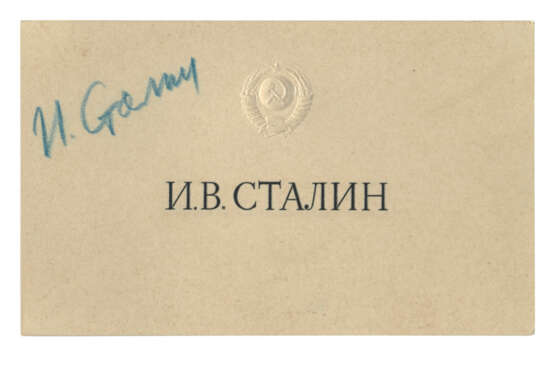ID 794449
Lot 70 | MOLOTOV, Vyacheslav Mikhailovich (né Skryabin; 1890-1988)
Estimate value
£ 7 000 – 10 000
An unpublished series of letters to his sister Zina, 1908-1919.
11 autograph letters and one letter signed (‘Vecha’ or ‘Vyacheslav’), mostly to his sister Zinaida (‘Zina’), [Kazan prison, Vologda and elsewhere], 28 August [1908] to 28 December 1919. In Russian. c.31 pages in total, various sizes, one a postcard, one letter and the postcard marked by the censor at Kazan prison [with:] Two autograph letters signed from his brother Sergei Skryabin (d.1919) to Zina, [Kazan], 24 January 1909 and 5 March 1909. In Russian, four pages in total;
[and:] 13 family photographs; two school textbooks in German and French inscribed by Molotov; an agricultural report with a presentation inscription from Molotov to Zina (‘To dear Sister Zina/From the author/25 Jan 1928’); and three recordings of speeches by Stalin, c.1936;
[and:] STALIN, Joseph (1878-1953). Printed calling card (‘I.V. Stalin’) signed by Stalin (in blue pencil, upper left).
The early life of an Old Bolshevik: a collection of unpublished material shedding light on the formative years of the Russian revolutionary Vyacheslav Molotov, latterly Foreign Minister of the Soviet Union and a close associate of Stalin, offered with a card signed by Stalin. Two of the first letters in this private correspondence addressed to Molotov’s sister Zina are jointly written by ‘Vecha’ – the diminutive of Vyacheslav – and his brother Sergei: Molotov talks of his student activities in Kazan [just before his arrest], while Sergei refers to events in their hometown of Nolinsk. By the time the following letter is written, on 8 April 1909, Molotov has been interned at Kazan prison – the letter bears the mark of the censor at the head – and writes to his sister of the conditions there, reassuring her that, although it is unpleasant to receive a letter from prison, he is certain he will be released once his case is heard. From Kazan prison, Molotov also writes a postcard to Nikolai Malviev, another political prisoner, regretting how long it has been since he has seen his old friend. The following three letters are written from exile in Vologda, describing his living conditions and restrictions, requesting that Zina send books and offering reassurance, not least that he has not slipped into the alcoholism common among the exiles. Following his release, three letters from 1911 talk of academic plans and the young men and women Molotov is meeting at the polytechnic – many ‘good comrades’ – with more about his new life of freedom and a job distributing books, which he does not enjoy in spite of his best efforts. The final letter is written after gap of six years, on 28 December 1919: it is a long letter on the death of his brother, Sergei. Molotov writes movingly about how wonderful, pure and kind Sergei was, gives an account of his brother’s death from smoke inhalation – caused by a malfunctioning stove in an adjoining room in his university halls – and describes Sergei’s funeral, the many mourners and wreaths, before promising to care for after his grave
Molotov’s affectionate, frank letters to his sister Zina cover a critical period of his early life about which little is generally known, namely, his internment for revolutionary activities as a student – first in Kazan prison from March 1909 until the autumn of that year, then in exile in Siberia until June 1911 – and his first months of freedom, as he quickly recommenced his revolutionary activities. They represent a rare appearance on the market of the personal correspondence of a leading figure in Soviet politics, an ally of Stalin who sat close to the centre of power for almost thirty years and who signed the Molotov–Ribbentrop Pact on behalf of the Soviet Union in 1939, enabling the partition of Poland with Nazi Germany.
Special notice
This lot has been imported from outside of the UK for sale and placed under the Temporary Admission regime. Import VAT is payable at 5% on the hammer price. VAT at 20% will be added to the buyer’s premium but will not be shown separately on our invoice.
| Place of origin: | Eastern Europe, Europe, Russia |
|---|---|
| Auction house category: | Letters, documents and manuscripts |
| Place of origin: | Eastern Europe, Europe, Russia |
|---|---|
| Auction house category: | Letters, documents and manuscripts |
| Address of auction |
CHRISTIE'S 8 King Street, St. James's SW1Y 6QT London United Kingdom | |
|---|---|---|
| Preview |
| |
| Phone | +44 (0)20 7839 9060 | |
| Buyer Premium | see on Website | |
| Conditions of purchase | Conditions of purchase |





